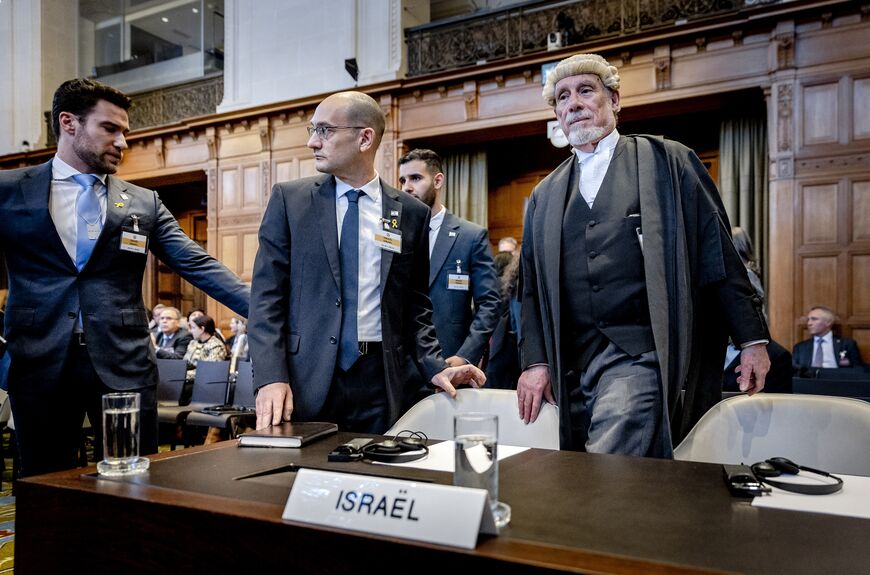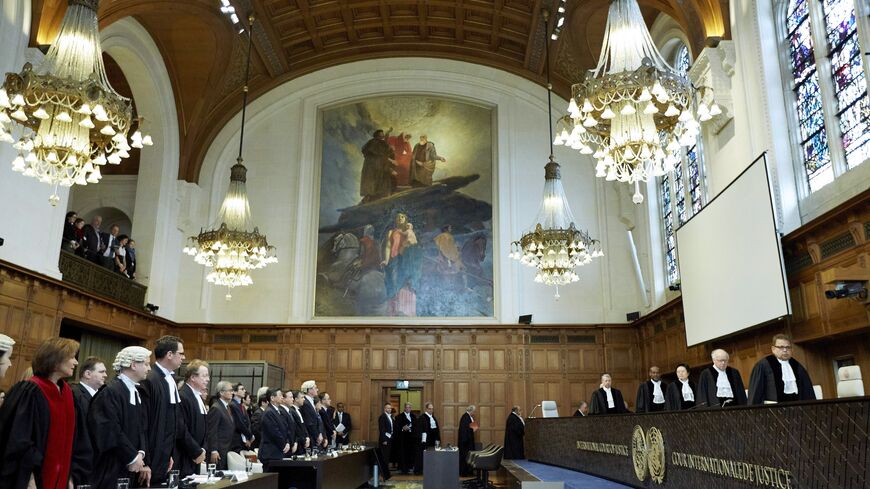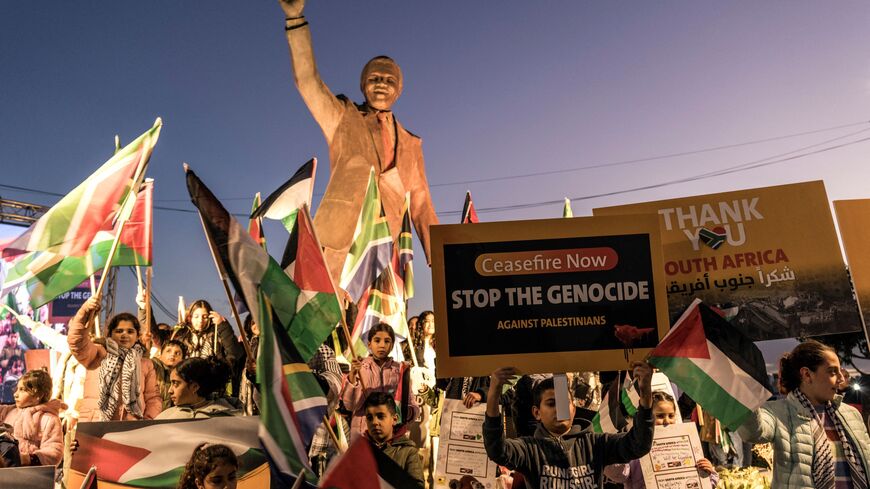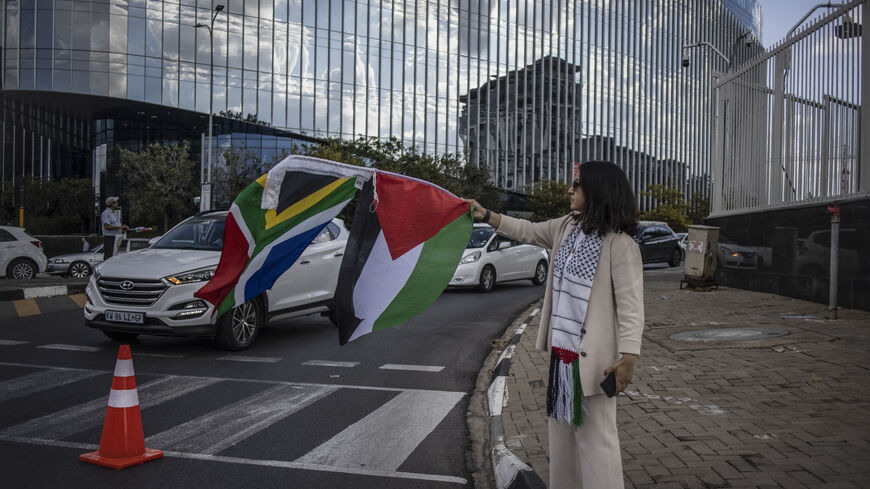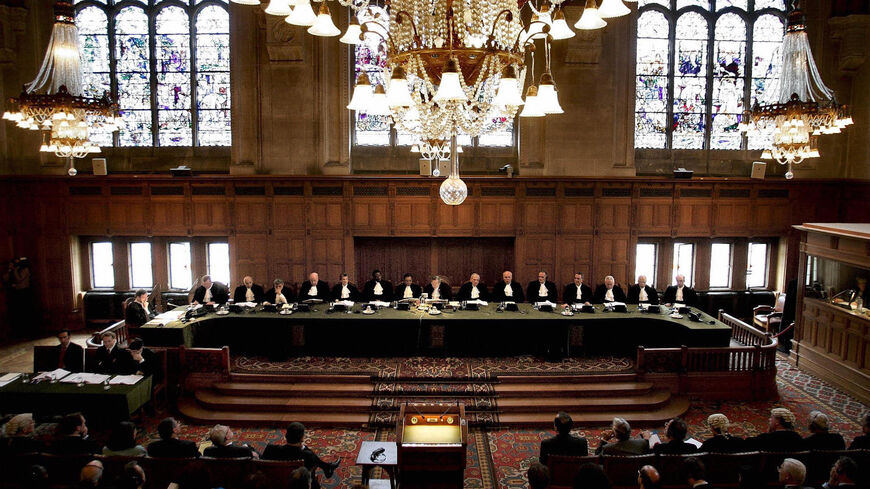What is the significance of ICJ ruling on Israel’s war in Gaza?
The ruling by the UN’s top court could push Israel to alter its military actions in Gaza, while the US’ response to the case may hurt its international standing.
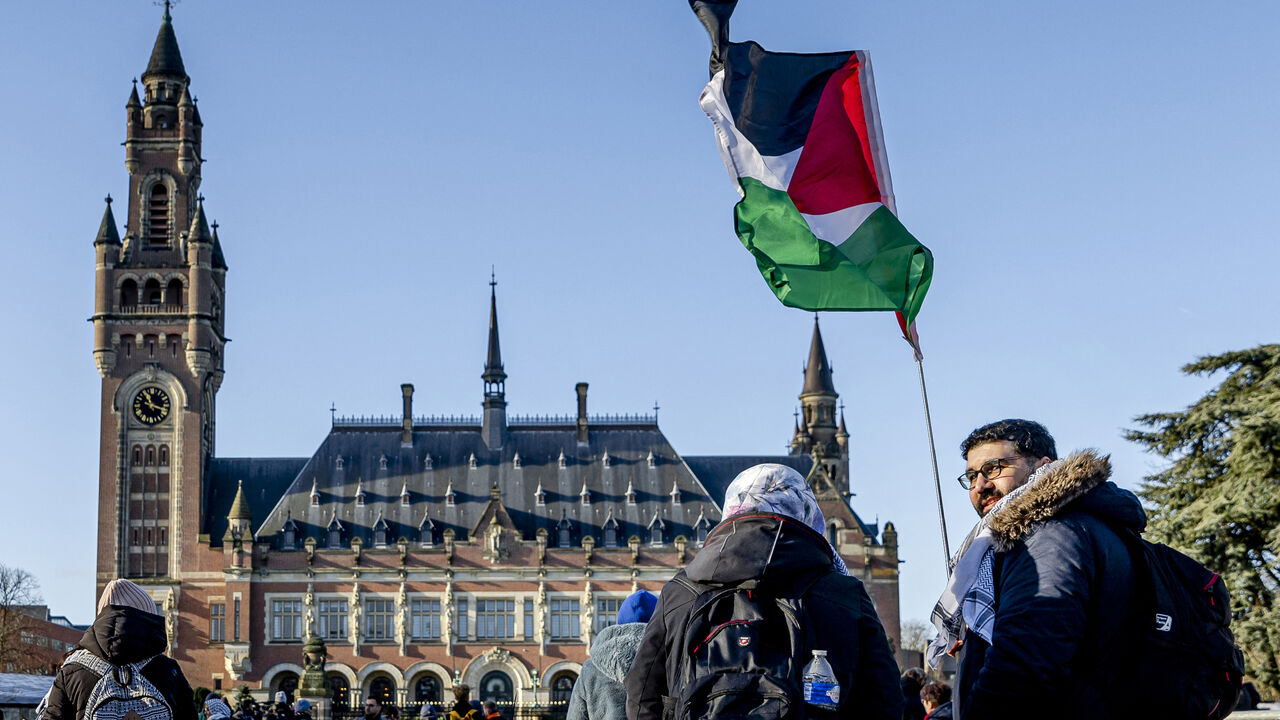
The International Court of Justice’s (ICJ) ruling on Friday in South Africa’s case against Israel could have significant effects on the Gaza war as well as US policy concerning the conflict. Experts who spoke to Al-Monitor argued that the ruling "stains" Israel's record, without, however, ordering the war to a halt or issuing a definitive verdict on the genocide accusation.
South Africa brought a case to the United Nations’ top court in late December, arguing that Israel is committing genocide against Palestinians in Gaza. The court heard arguments from both countries at the Hague earlier this month.
On Friday, the ICJ made a number of rulings pertaining to the case. The court said Israel must “take all measures within its power to prevent the commission” of forbidden acts under the Genocide Convention. These acts include “killing members of the group,” referring to the Palestinians, and “deliberately inflicting on the group conditions of life calculated to bring about its physical destruction,” according to the order published by the court.
The court added that “Israel must take all measures within its power to prevent and punish the direct and public incitement to commit genocide.” This order is in reference to statements made by some Israeli politicians, including Defense Minister Yoav Gallant. As noted in the order, Gallant said on Oct. 9, “I have released all restraints” in regard to the fight against Hamas, among other things.
Regarding the dire humanitarian situation in Gaza, the court said that “Israel must take immediate and effective measures to enable the provision of urgently needed basic services and humanitarian assistance.”
The court further called for the “immediate and unconditional release” of the hostages held by Hamas and other groups in Gaza.
Israel must submit a new report within one month on the measures it is taking to comply with the order, according to the court.
"Soft orders"
The ruling in the genocide case is not a definitive one. The ICJ merely ruled it has jurisdiction in the case, ordered some measures and declared that some of South Africa’s case is plausible. A final ruling could take months or years.
Yaniv Roznai, a professor at Reichman University's law school in Israel, referred to the court’s actions as “soft orders” that do not completely undermine Israel’s ability to respond to Hamas, and said the orders to allow humanitarian aid and investigate incitement in particular “seem reasonable.”
“The court chose interim measures in the sense that it did not go all the way to the end and accept South Africa's claim to order a full stop of the hostilities,” Roznai told Al-Monitor. “This would completely undermine the ability of Israel to exercise its right to self-defense. Rockets are still being launched.”
Heidi Matthews, a professor at Canada’s Osgoode Hall Law School, called the ruling a “landmark decision” and said the orders the court ruled demonstrates the plausibility of South Africa’s case.
“For the court to order provisional measures, it needs to be satisfied that the rights that are sought to be protected under the Genocide Convention are plausible and that there's an urgent need to protect them,” she said.
"Permanently stained"
Though the ruling is not final, it could have an effect on Israel’s conduct in Gaza. Because Israel was ordered to report back to the court within a month, the Israeli military “might be more careful” in Gaza for the time being, Roznai said.
Fania Oz-Salzberger, a professor at University of Haifa’s law school, said, “I expect more Israeli efforts to reduce the civilian toll and more humanitarian aid to enter Gaza."
Regardless of the effect on the war, the ruling has significantly hurt Israel’s international standing, according to Zaha Hassan, a human rights lawyer and fellow at the Carnegie Endowment for International Peace.
“Israel has been permanently stained by the label of genocide from 15 international jurists at the World Court," Hassan told Al-Monitor.
Hassan added that the court’s ruling hurt Israel’s argument of self-defense.
“Israel has long justified its political violence vis-à-vis Palestinians as security measures or as actions in furtherance of its legitimate self-defense … The court essentially dismissed such justifications in this context,” she said. “There is no justification for genocidal acts.”
Israel will need to alter its conduct in Gaza in order to prevent a ruling in South Africa’s favor on the merit of the case, according to Hassan.
“To avoid a ruling on the merits, Israel must change everything it is doing in Gaza, since everything it has been doing involves destroying Palestinian life there,” she said.
Israel’s leaders have said they will continue fighting Hamas in Gaza regardless of the court’s decisions. Israeli Prime Minister Benjamin Netanyahu reiterated on Friday following the ruling that “Israel has a basic right to defend itself” and called the genocide accusation “outrageous.”
Effects on Hamas
Hamas praised the ruling. Senior official Sami Abu Zuhri said, “We call for compelling the occupation to implement the court’s decisions,” Reuters reported.
Hamas had previously said it would abide by a cease-fire if the ICJ ordered one. Though the court did not do so, it did call for the release of the hostages.
Oz-Salzberger said the court's inclusion of a call for the hostages to be released is significant to Israelis.
"Many Israelis genuinely feel that the world doesn’t care about them; the court wisely assures us it does," she said.
Osama Hamdan, another senior Hamas official, said on Thursday that the group would release the hostages if Israel releases all Palestinian prisoners, according to Reuters.
Some observers said the court’s ruling did not focus sufficiently on Hamas. Roznai called the court’s rhetoric in the order “extremely one-sided,” pointing out that the court did not significantly mention Hamas’ Oct. 7 attack on Israel, outside of the introduction. The court additionally did not distinguish between civilians and Hamas fighters, according to him.
“When the court mentioned the number of deaths, it failed to distinguish between civilians and those who do participate in hostilities, which, in my mind, is highly problematic,” he said.
The ruling could embolden Hamas, according to Roznai.
"The more the court is inclined to continue these charges, [the more] this rewards Hamas and possibly other groups,” he said.
The court may have limited options in reigning in Hamas. Matthews said it is “really hard to say” how the ruling will affect the group’s actions, pointing out that the “ICJ does not have the legal authority to order Hamas or any other non-state actor to do anything.”
Concerns for the US
The US has been dismissive of South Africa’s case. In remarks sent to Al-Monitor on Friday, a State Department spokesperson called the genocide accusations unfounded, said the ruling is consistent with the US’ support for Israel’s right to self-defense and pointed out the court’s call on Hamas to release the hostages.
According to Hassan, the American position on the genocide case could hurt the US’ credibility.
“The US has to be concerned about being complicit in genocide,” she said. “How it can ignore the decision today and still have any credibility as a normative actor on the world stage is hard to square.”
The US position on the issue could cause tensions between Washington and its European allies as well, according to her.
“If the US maintains its position of no-daylight with Israel, it will create real tensions in the US relationship to the EU and certain European countries,” she said.
"Renewed public attention"
South Africa’s case against Israel is not completely unprecedented. In 2019, Gambia brought a case against Myanmar to the ICJ, alleging the country had committed genocide against the Rohingya people.
However, the current case against Israel has elevated the ICJ’s stature to a new level, according to Matthews.
“What is really remarkable is there has been renewed public attention to the workings of the International Court of Justice in this conflict,” she said. “We saw a little bit of that with Russia and Ukraine. But certainly the level of interest in international law and the role of the world court here is greater than I've seen it.”

